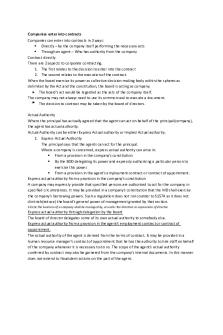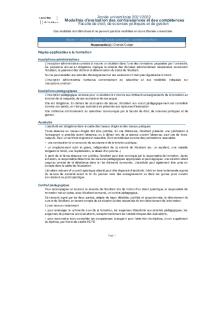Authority of the Solemnizing officer PDF

| Title | Authority of the Solemnizing officer |
|---|---|
| Author | ARIEL LOQUIAS |
| Course | Juris Doctorate |
| Institution | University of Bohol |
| Pages | 2 |
| File Size | 50.1 KB |
| File Type | |
| Total Downloads | 81 |
| Total Views | 162 |
Summary
FAMILY CODE - Authority of the Solemnizing officer...
Description
AUTHORITY OF THE SOLEMNIZING OFFICER Article 7 of the Family Code provides that the Marriage may be solemnized by: (1) Any incumbent member of the judiciary within the court’s jurisdiction; The Justices of the Supreme Court, the Court of Appeals, the Sandiganbayan can solemnize marriages all over the Philippines because their jurisdiction covers the whole country, regardless of the venue, as long as the requisites of the Family Code are complied with. The Judge of the Regional Trial Court and Municipal or Metropolitan Trial Court judges can only solemnize marriages within their territorial jurisdiction. In the case of Navarro vs. Dumagtoy, the court ruled that “where a judge solemnizes a marriage outside his court’s jurisdiction, there is a resultant irregularity in the formal requisite laid down in Article 3, which while it may not affect the validity of the marriage, may subject the officiating official to administrative liability.” The reason that, such solemnization is only a formal requisite. A defect in a formal requisite of marriage does not go into the validity of the marriage. But it affects the three-fold responsibility of the solemnizing officer, like criminal, civil and administrative responsibility. Moreover, article 7 par. 1 of the Family Code emphasized that judges, must be incumbent and not retired judges. (2) Any priest, rabbi, imam, or minister of any church or religious sect duly authorized by his church or religious sect and registered with the civil registrar general, acting within the limits of the written authority granted him by his church or religious sect and provided that at least one of the contracting parties belongs to the solemnizing officer’s church or religious sect; A priest who is commissioned and allowed by his local ordinance to marry the faithful is authorized to do so only within the area or diocese or place allowed by his Bishop. Marriages solemnized by the priest who does not have the authority is considered void, except when the parties or one of the parties believed in good faith that the priest had the authority to solemnize their marriage. Belief in good faith makes the marriage valid. (3) Any ship captain or airplane chief only in the cases of marriage in articulo mortis or at the point of death;
A marriage in articulo mortis or at the point of death between passengers or crew members may also be solemnized by a ship captain or by an airplane pilot not only while the ship is at sea or the plane is in flight, but also during stopovers at ports of call The ship captain or the airplane chief is authorized to solemnize and marry only the passengers and crew members. (4) Any military commander of a unit to which a chaplain is assigned, in the absence of the latter, during a military operation, likewise only in the cases marriage in articulo mortis or at the point of death; or A military commander of a unit, who is a commissioned officer, shall likewise have authority to solemnize marriages in articulo mortis or at the point of death between persons within the zone of military operation, whether members of the armed forces or civilians. (5) Any consul-general, consul or vice-consul in cases of marriage between Filipino citizens abroad. Marriage between Filipino citizens abroad may be solemnized by a consul-general, consul or vice-consul of the Republic of the Philippines. The issuance of the marriage license and the duties of the local civil registrar and of the solemnizing officer with regard to the celebration of marriage shall be performed by said consular official. Article 7 par. 5 of Family code clearly refers to marriages “abroad.” Thus, a consulgeneral, consul, and vice-consul have no authority to solemnize a marriage within the territory of the Philippines. In addition, R.A. 7160 otherwise known as the Local Government Code of the Philippines provides that the City or Municipal Mayors is authorized to solemnize but within their area of jurisdiction. Ambassadors and Governors cannot solemnize marriages anymore. They are excluded by the law (What the law does not include, it excludes). And finally, the solemnizing officer may be held criminally liable under Article 352 of the Revised Penal Code, as amended, penalizes an authorized solemnizing officer who shall perform or authorize any illegal marriage ceremony. The elements of this crime are as follows: (1) Authority of the solemnizing officer; and (2) his performance of an illegal marriage ceremony....
Similar Free PDFs

Hierarchy of authority
- 2 Pages

Breach of warranty of authority
- 2 Pages

Officer interview
- 2 Pages

Authority - new
- 5 Pages

Authority - 123
- 3 Pages

4214-CP6266 Compliance Officer
- 8 Pages

Program Officer List - MAkeup
- 17 Pages
Popular Institutions
- Tinajero National High School - Annex
- Politeknik Caltex Riau
- Yokohama City University
- SGT University
- University of Al-Qadisiyah
- Divine Word College of Vigan
- Techniek College Rotterdam
- Universidade de Santiago
- Universiti Teknologi MARA Cawangan Johor Kampus Pasir Gudang
- Poltekkes Kemenkes Yogyakarta
- Baguio City National High School
- Colegio san marcos
- preparatoria uno
- Centro de Bachillerato Tecnológico Industrial y de Servicios No. 107
- Dalian Maritime University
- Quang Trung Secondary School
- Colegio Tecnológico en Informática
- Corporación Regional de Educación Superior
- Grupo CEDVA
- Dar Al Uloom University
- Centro de Estudios Preuniversitarios de la Universidad Nacional de Ingeniería
- 上智大学
- Aakash International School, Nuna Majara
- San Felipe Neri Catholic School
- Kang Chiao International School - New Taipei City
- Misamis Occidental National High School
- Institución Educativa Escuela Normal Juan Ladrilleros
- Kolehiyo ng Pantukan
- Batanes State College
- Instituto Continental
- Sekolah Menengah Kejuruan Kesehatan Kaltara (Tarakan)
- Colegio de La Inmaculada Concepcion - Cebu








